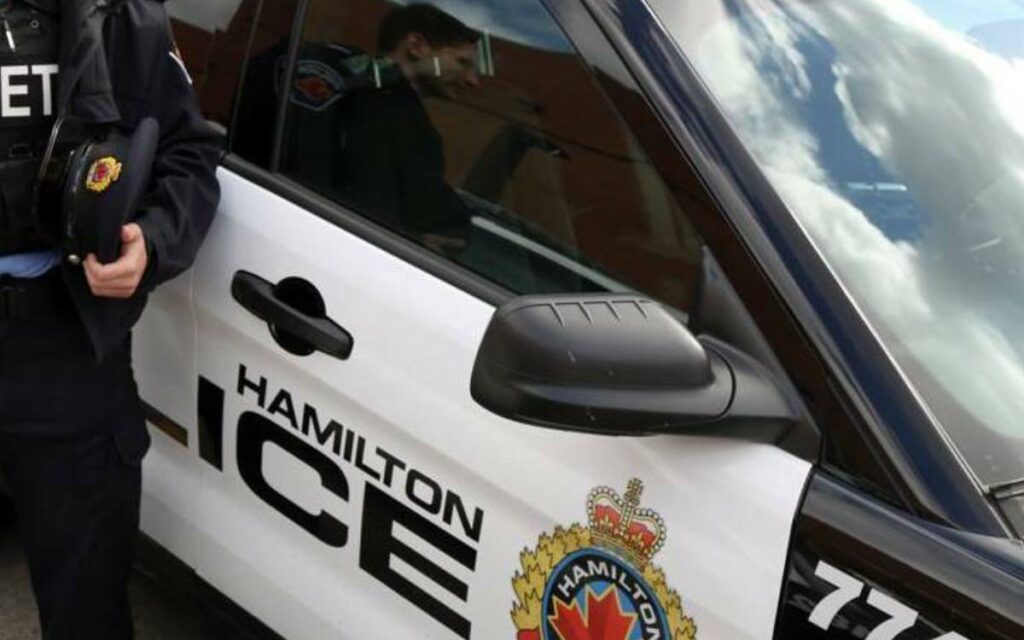
The program, particularly the balancing of the positive aspects of drone usage with privacy concerns, remains an ongoing area of interest for privacy experts and citizens alike. Photo credit: Hamilton Police Service
A new Hamilton Police Service (HPS) report written by Sgt. Fab Giuliani for the city’s Police Services Board recommends expansion of the force’s drone program.
The document also provides data detailing the uses of police drones since the program’s launch in 2020.
The report reads that the program has given the police force new abilities that were previously unavailable or required the solicitation of aircraft from outside agencies.
The paper notes that the police use drones for five different purposes: searching for missing persons, serious/fatal traffic collision investigations, crime scene investigations, critical incident applications, and monitoring large-scale events.
Drone usage is governed by Hamilton Police Service Standard Operating Procedure (SOP). Police say drones are only deployed under strict conditions.
Additionally, there are provisions of the Municipal Freedom of Information and Protection of Privacy Act (MFIPPA) and Guidelines for Using Video Surveillance issued by the Information and Privacy Commissioner of Ontario.
HPS says that they inform the public as much as possible when drones are flying in public areas and also reportedly “limit the amount of personal information that is collected and retained.”
HPS currently has four drone units: two DJI Mavic 2 Enterprise/Dual units, one DJI mini, and one Sky Hero Loki II.
Data compiled in the report notes that, from 2021 to May 15, 2023, drones were used in 59 separate incidents.
That includes 24 times for collision reconstruction (41 per cent of all uses), 12 times for investigative reasons (20 per cent), 10 times for search and rescue situations (17 per cent), seven times for critical incidents (12 per cent) and six times for large-scale events (10 per cent).
HPS notes that drones assisted with the location of two missing elderly citizens. In November 2022, an elderly female suffering from dementia was located safely because of the drone program. And in January 2023, a 90-year-old male was located in stable condition by a drone.
However, the police force notes that both incidents involved Hamilton Fire Department (HFD) drones “due to the unavailability of HPS pilots.”
The report also details the benefits of drones in each of the five previously mentioned police situations. In terms of collision reconstruction and investigative work, HPS notes that drones are able to map large scenes quickly, allowing roads and crime scene areas to reopen faster.
For critical incidents such as barricaded persons, drones provide ongoing information to assist Incident Commanders. For large-scale events, drones can help locate a lost child, identify criminal activities, and respond to the location of medical emergencies.
HPS notes that they currently have 11 members trained as drone pilots.
Somewhat addressing various citizen concerns, the report also reads that HPS “has never considered arming drone units or utilizing facial recognition software with the program.”
However, HPS notes that the current fleet of drones is limited in its flight capabilities in poor weather and the drone fleet can only fly for rather limited durations.
Additionally, HPS say they have a small number of pilots.
They note that they often have to seek the involvement of the HFD and Mohawk College to assist with ground search and rescue which results in delays and dependence on those agencies and “ties up resources that may be needed elsewhere.”
Thus, the report recommends expanding RPAS response capabilities by increasing the number of pilots and units available to HPS. It remains to be seen if the Police Service Board will approve the move.
Additionally, CBC Hamilton’s Bobby Hristova has written a number of articles recently investigating the HPS drone program, particularly analyzing potential privacy issues, police transparency regarding drone usage, and potential holes in its policies.
His articles note concerns from Ann Cavoukian, the former Information and Privacy Commissioner of Ontario and Brenda McPhail the director of privacy, technology, and surveillance for the Canadian Civil Liberties Association regarding public consultation and data collection.
For example, police deployed drones for large-scale events like the McMaster University “fake homecoming” party, the 2021 Grey Cup in Hamilton, and to monitor anti-Trudeau, anti-mandate protestors during Justin Trudeau’s cabinet retreat in Hamilton.
Questions have been raised if such deployments are necessary or appropriate to monitor situations wherstreet e people are abiding by the law or when large numbers of bystanders are being recorded in addition to potential lawbreakers.

Based in Hamilton, he reaches hundreds of thousands of people monthly on Facebook, Instagram, TikTok, and Twitter. He has been published in The Hamilton Spectator, Stoney Creek News, and Bay Observer. He has also been a segment host with Cable 14 Hamilton. In 2017, he received the Chancellor Full Tuition Scholarship from the University of Ottawa (BA, 2022). He has also received the Governor General’s Academic Medal. He formerly worked in a non-partisan role on Parliament Hill in Ottawa.






